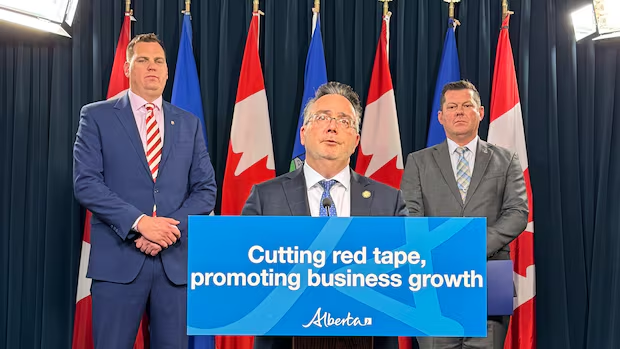Alberta government slashing regulations for identification, international professionals, tourism, hunting

The Alberta government says it is cutting regulations that oversee driver’s licences and ID cards, all-season resorts, accreditation for international professionals and deer and elk hunting.
Bill 10, the Red Tape Reduction Statutes Amendment Act, includes five legislative amendments which were tabled by Service Alberta and Red Tape Reduction Minister Dale Nally in the legislature on Monday.
“Alberta has reduced red tape by 35 per cent since 2019,” he said during a news conference. “We’ve eliminated nearly 220,000 regulatory requirements and completed hundreds of initiatives to reduce red tape.
“Cumulatively, all this work has generated more than $3 billion in savings for Albertans and Alberta businesses.”
Here are some of the changes that are part of the Red Tape Reduction Statutes Amendment Act.
Alberta identification changes
The government said it will make it mandatory for Canadian citizenship and public health-care numbers to be included on pieces of identification like driver’s licences.
This would amend both the Traffic Safety Act and Government Organization Act.
“The good news is you only have to do it once, and then when you’re applying for future benefits with the government of Alberta, it’s going to make it easier for you, ” Nally said, adding the change is expected to take place by mid-2026.
In September, Premier Danielle Smith announced the province would add citizenship markers to allow Albertans to more effectively apply for funding and services like student aid, health benefits and disability supports.
Smith said the incorporation of the new mandatory marker would ensure that Alberta was “prioritizing those who are Canadian citizens first” in accessing social services.
However, Alberta Privacy Commissioner Diane McLeod said in September that she’s concerned about the provincial government’s plan.
She said at the time that her office was not informed about the new rule and that it was unclear how the new markers will benefit Albertans.
The privacy commissioner’s office is currently looking at the potential impact of adding the citizenship markers.
Nally said it will be up to the health ministry whether the province makes the switch away from paper health cards.
Recognition of international accreditation
The Fair Registration Practices Act will be amended so that first-time applicants who are professionals with international experience have access to working in regulated professions.
If passed, amendments would prohibit Alberta regulatory bodies from requiring proof of Canadian work experience for registration with a regulatory body, unless an approval is granted for public health or safety reasons.
The province said the amendment is intended to address labour shortages in industries like health care and the trades.
In a CBC/Pollara survey from January, 54 per cent of surveyed immigrants living in Canada said it was difficult to find a job in their field.
A little more than 1,500 adult Canadian residents were surveyed online between Nov. 1 and 18, 2024. They all arrived in Canada in the past 10 years.
Just over 15 per cent reported that their credentials or academic degrees weren’t recognized in Canada.
Lifting regulations on deer and elk hunting
The Livestock Industry Diversification Act oversees the licensing of diversified livestock farms, including cervids like deer and elk.
Amendments to the act, if passed, will remove the prohibition on hunting domestic farmed cervids.
The government said changes would allow the operation of harvest preserves, enterprises where clients pay for the experience of participating in a controlled harvest of domestic cervids on licensed, privately owned land.
“There’s been a lot of changes in the cervid industry when it comes to domestic production over the last few decades,” said Agriculture and Irrigation Minister RJ Sigurdson.
“What we heard from that industry was due to limited export opportunities, they were looking at us to be able to consider cervid harvest preserves to allow that to happen within the province of Alberta, so they have an additional opportunity for revenue.”
A change to the Meat Inspection Regulation, under the Meat Inspection Act, would also be needed to allow the use of the harvested meat by those who hunt.
The government said the changes would bring in more revenue to the cervid farming industry.
However, preserves still need to adhere to existing regulation, including record-keeping of animals and their movements, and following comprehensive chronic wasting disease testing protocols, to minimize the risk of disease spread.
“There is CWD present both in the wild and we do see it as well in the domestic populations,” Sigurdson said, adding that stringent testing will continue.
Between 2024 and 2025, the province tested 2,963 wild cervids with CWD being detected in 472 wild deer, elk and moose.
All-season resorts
The All-Season Resorts Act was approved in 2024. It aims to streamline potential year-round, resort-based development on public land.
The government has estimated it could bring in $2 billion annually in visitor spending and an extra $4 billion in GDP in the first decade.
Amendments to the act, if approved, would update the definition of “all-season resort development” to allow private lands to be a part of an all-season resort and clarify that the All-season Resort regulator can provide approvals under the Water Act and Environmental Protection and Enhancement Act for these private lands as part of resort development.
An official with the Canadian Parks and Wilderness Society’s southern Alberta chapter previously said it would be important to balance conservation and visitation.





